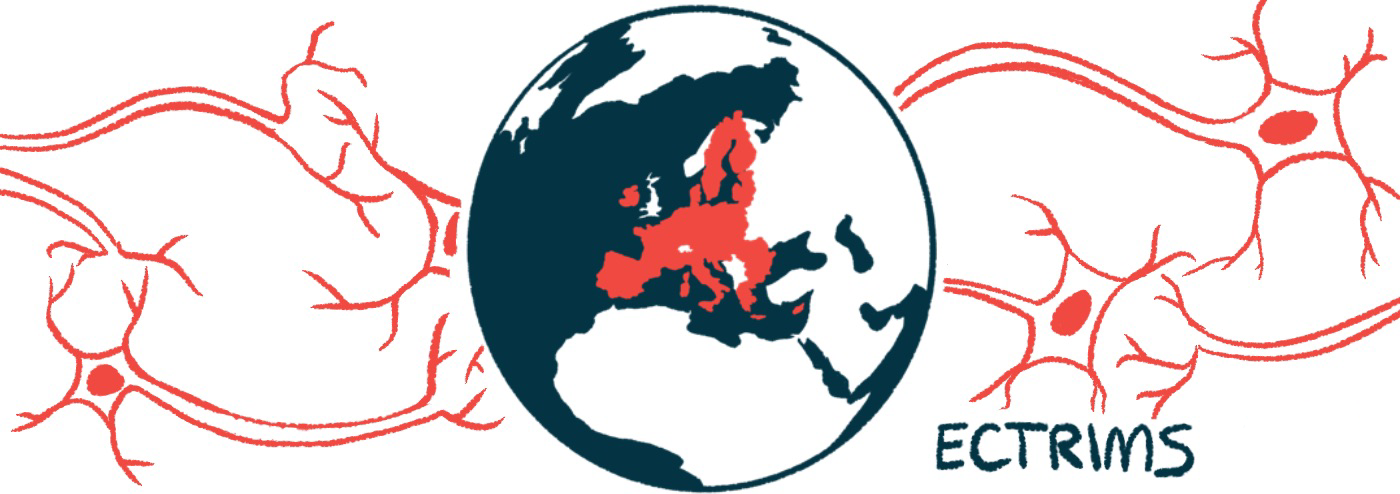ECTRIMS 2024: MS relapse rates fall with 5 years on Briumvi
Annualized rate equals 1 relapse every 50 years, data show
Written by |

Continuous treatment with Briumvi (ublituximab) over five years was associated with low rates of relapses and confirmed disability progression among people with relapsing forms of multiple sclerosis (MS), according to analyses from the open-label extension (OLE) phase of the treatment’s ULTIMATE Phase 3 trials.
Relative to patients who started off on the oral therapy Aubagio (teriflunomide) and switched to Briumvi two years later, those on Briumvi for five years continued to experience lower rates of disability progression and higher rates of disability improvement, supporting the benefits of early treatment with high-efficacy therapies such as Briumvi.
The findings from Briumvi’s developer TG Therapeutics, were presented at the 2024 European Committee for Treatment and Research in Multiple Sclerosis (ECTRIMS) annual meeting, taking place Sept. 18-20 in Copenhagen and online.
The poster, “Five years of Ublituximab in relapsing multiple sclerosis: additional results from open-label extension of ULTIMATE I and II studies,” was presented by Bruce Cree, MD, PhD, a professor of neurology and investigator at the University of California San Francisco.
“The long-term data presented today continues to demonstrate Briumvi’s potential for impacting the lives of [relapsing MS] patients worldwide,” Cree said in a company press release. “The sustained clinical efficacy as illustrated by extremely low rates of relapse and limited disability progression combined with a tolerable safety profile at this 5 year follow up is important for clinicians and patients alike when considering high-efficacy therapy options.”
Briumvi vs. Aubagio
Briumvi is an antibody therapy designed to deplete levels of B-cells, an immune cell population implicated in the autoimmune attacks that characterize MS. It’s given via infusions directly into the bloodstream.
The identical ULTIMATE I (NCT03277261) and ULTIMATE II (NCT03277248) Phase 3 clinical trials, which collectively enrolled more than 1,000 people with relapsing forms of MS, were designed to evaluate the safety and efficacy of Briumvi against Aubagio.
Findings from the studies demonstrated that Briumvi led to significant reductions in disease activity relative to Aubagio over a two-year period, including significant reductions in annualized relapse rates (ARRs), or the average number of relapses per year, and brain lesions. Rates of disability progression were similar with the two therapies, but more patients on Briumvi experienced confirmed disability improvement over the trials’ two years.
More than 85% of participants in either arm then entered into the OLE (NCT04130997), in which patients on Briumvi continued treatment and those on Aubagio switched to Briumvi. Cree described three years’ worth of data from the OLE, amounting to five years of continuous Briumvi treatment for those who started on it in the main trial.
During the first year in the OLE, patients who switched to Briumvi from Aubagio experienced a significant, 58.4% reduction in ARR, from an average of 0.182 in the second year of the main trial to 0.076 after one year of Briumvi. These rates continued to drop over time in this group, reaching 0.045 relapses per year in the third OLE year.
For those who had continued on Briumvi from the main trial, ARRs remained low and continued to decrease through the five years of treatment. By the fifth year, the ARR was 0.020, equating to about one relapse every 50 years.
‘Impressively low’ disability progression
Rates of 24-week confirmed disability progression (CDP), defined as an increase in score on the Expanded Disability Status Scale (EDSS) that is sustained for at least six months, also remained “impressively low,” said Michael Weiss, chairman and CEO of TG.
By the end of the fifth year, 24-week CDP was observed in 8% of those in the continuous Briumvi group and 14.3% of those in the switch group, corresponding to a 38.8% reduction in the risk of CDP in the Briumvi group.
On the other hand, 24-week confirmed disability improvement, defined as a reduction in EDSS score sustained for at least six months, was observed in 17% of the continuous group and 12.2% of the switch group, being 47.2% more likely in patients receiving continuous Briumvi.
“Early initiation of [Briumvi] and continued treatment over a period of 5 years provided MS patients with sustained clinical benefit,” the researchers said.
The safety profile of Briumvi was consistent over five years, with no new signals identified.
In a separate poster, “Comparison of Multiple Sclerosis Disease Activity (MSDA) Test Results Between Patients Treated with Ublituximab and Teriflunomide in the Phase 3 ULTIMATE I and II Studies,” researchers described findings from another analysis that compared overall disease activity between a subset of patients on Briumvi or Aubagio in the main ULTIMATE trials.
They used the Multiple Sclerosis Disease Activity Test, a validated assay that measures levels of 18 different protein biomarkers to generate an overall disease activity score and scores for four individual disease pathways implicated in MS.
Results from that analysis showed that Briumvi was associated with significantly lower overall disease activity scores and scores for each of the disease pathways relative to Aubagio.
While some 80%-85% of patients in both groups were considered to have moderate to high disease activity scores at the start of the ULTIMATE trials, 100% of Briumvi-treated patients had low disease activity scores after two years of treatment, compared with 30% of those on Aubagio.
“We believe that these data continue to support Briumvi’s role as a valuable treatment option for patients with relapsing forms of MS,” Weiss said.




